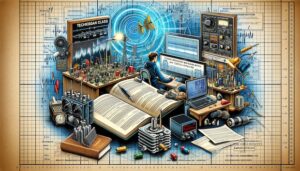The provided set of ten questions offers a comprehensive overview of the fundamental principles of radio theory, which is a crucial component of the Technician Class ham radio exam. These questions are meticulously designed to test an aspirant’s understanding of electromagnetic waves, electronic components, circuit elements, and the operational characteristics of radio equipment—knowledge that is essential for any amateur radio operator. By covering topics from the nature of radio waves to the specific functions of components like capacitors, inductors, and transistors, these questions help ensure that candidates possess a solid grounding in how radio systems work, which is vital for both passing the exam and for practical radio operation.
#1. What is the basic component of a radio wave?
#2. What property of a radio wave is measured in Hertz (Hz)?
The frequency of a radio wave, measured in Hertz (Hz), indicates how many cycles of the wave occur in one second.
Results
These questions cover a range of topics within the radio theory section of the Technician Class exam, providing a foundational understanding crucial for every aspiring amateur radio operator.
These questions cover a range of topics within the radio theory section of the Technician Class exam, providing a foundational understanding crucial for every aspiring amateur radio operator.
Following the set of questions provided, it’s imperative to dive into why these particular topics are vital for anyone aspiring to pass the Technician Class ham radio exam and engage effectively in the amateur radio community.
Electromagnetic Waves and Frequency
Understanding electromagnetic waves and their properties, such as frequency, is foundational. Radio waves are the medium through which all amateur radio communication occurs. Grasping this concept ensures operators can choose appropriate frequencies for different types of communication, understand band allocations, and comply with FCC regulations.
Electronic Components and Circuits
Knowledge of electronic components (capacitors, inductors, resistors, transistors) and their roles in circuits underpins the ability to construct, modify, and repair radio equipment. For example, capacitors store electrical energy and are crucial in tuning circuits, while inductors, which store energy in a magnetic field, are key in filtering and impedance matching. Understanding these components allows operators to not only set up their stations efficiently but also troubleshoot issues effectively.
Antennas and Transmission
The antenna’s role in converting electrical energy into radio waves and vice versa is central to all forms of wireless communication. A well-chosen antenna can significantly enhance the reach and clarity of transmissions. Questions on antenna theory test an examinee’s ability to select and install antennas that best suit their operational goals and physical constraints.
Modulation and Receiver Operation
Familiarity with different modulation types, especially Frequency Modulation (FM), which is widely used in VHF/UHF communication, is critical for effective operation. Moreover, understanding how a receiver distinguishes between desired signals and noise (selectivity) ensures an operator can maintain clear communication in various conditions.
Practical and Regulatory Knowledge
Questions about FCC regulations, power sources, and RF amplifiers touch on practical aspects of setting up and operating an amateur radio station within legal boundaries. Knowing the typical voltage of power sources like nickel-cadmium cells, for instance, is practical for maintaining portable equipment. Similarly, recognizing the function of transistors as RF amplifiers ties into the broader need for technical proficiency in enhancing signal strength and quality.
Conclusion
The detailed examination of these topics underscores the blend of theoretical knowledge and practical skills necessary for success both on the exam and in amateur radio operation. This comprehensive approach ensures that aspiring operators are not only prepared to pass the Technician Class exam but are also equipped with the understanding needed to contribute meaningally to the amateur radio community. The emphasis on foundational principles, combined with an appreciation for the regulatory and operational aspects of ham radio, prepares individuals for a rewarding experience in this fascinating hobby.



